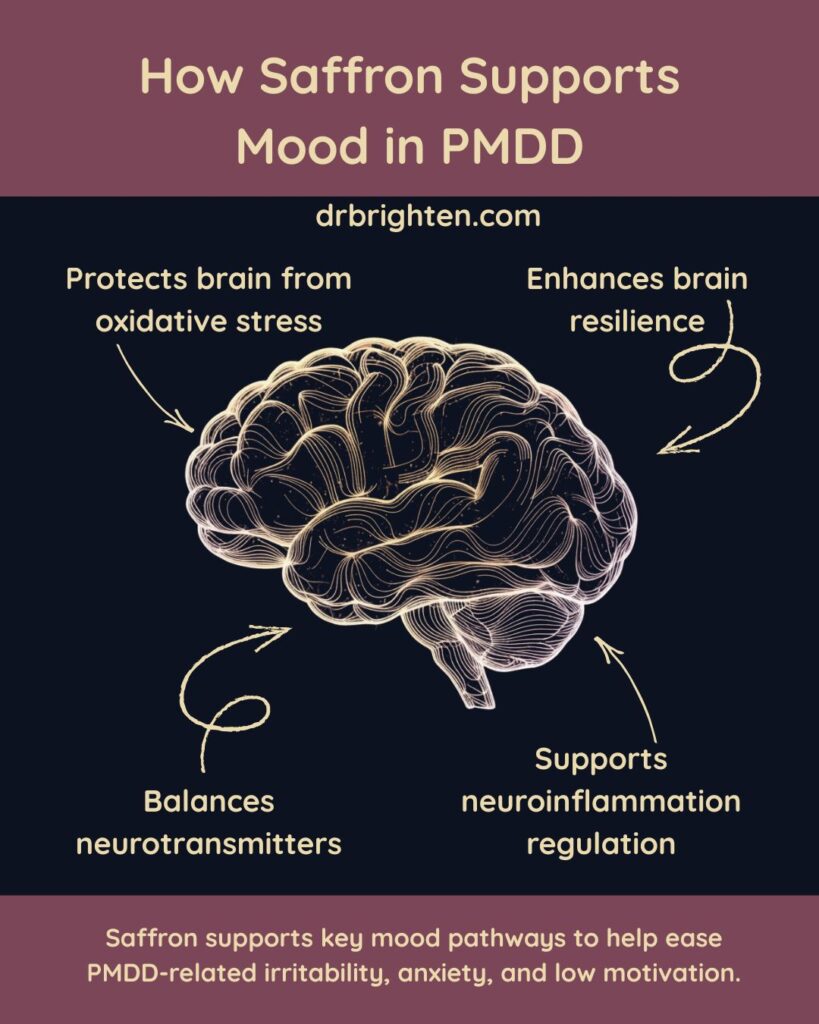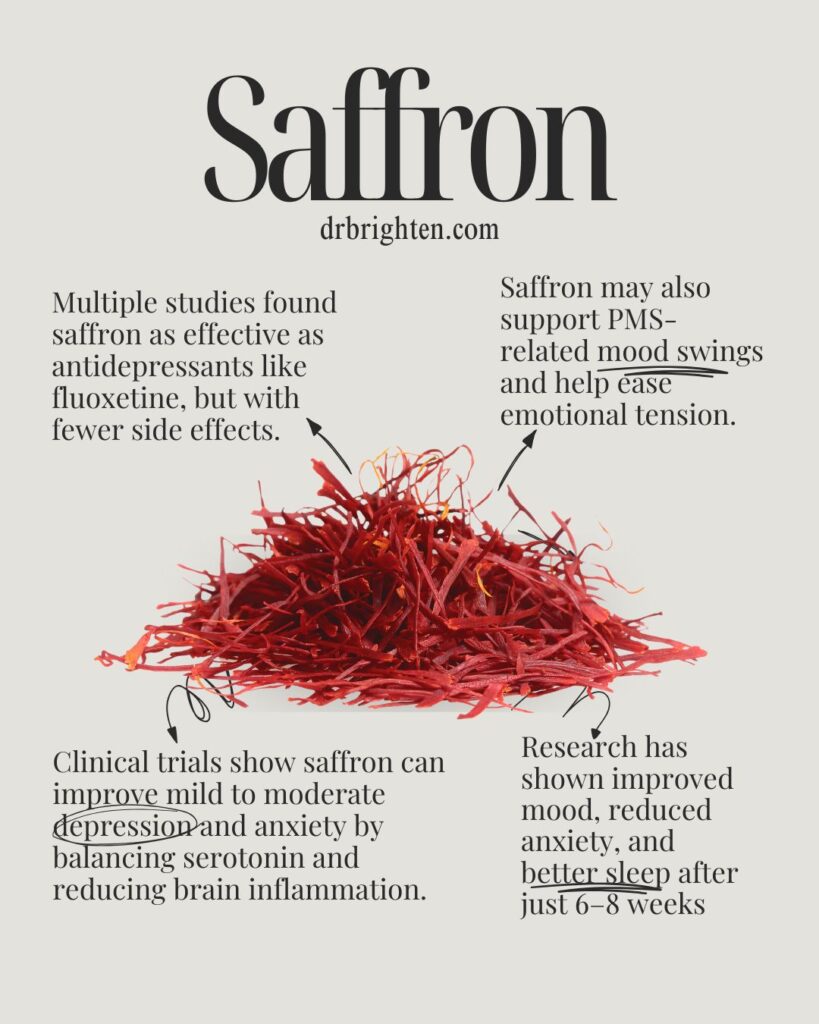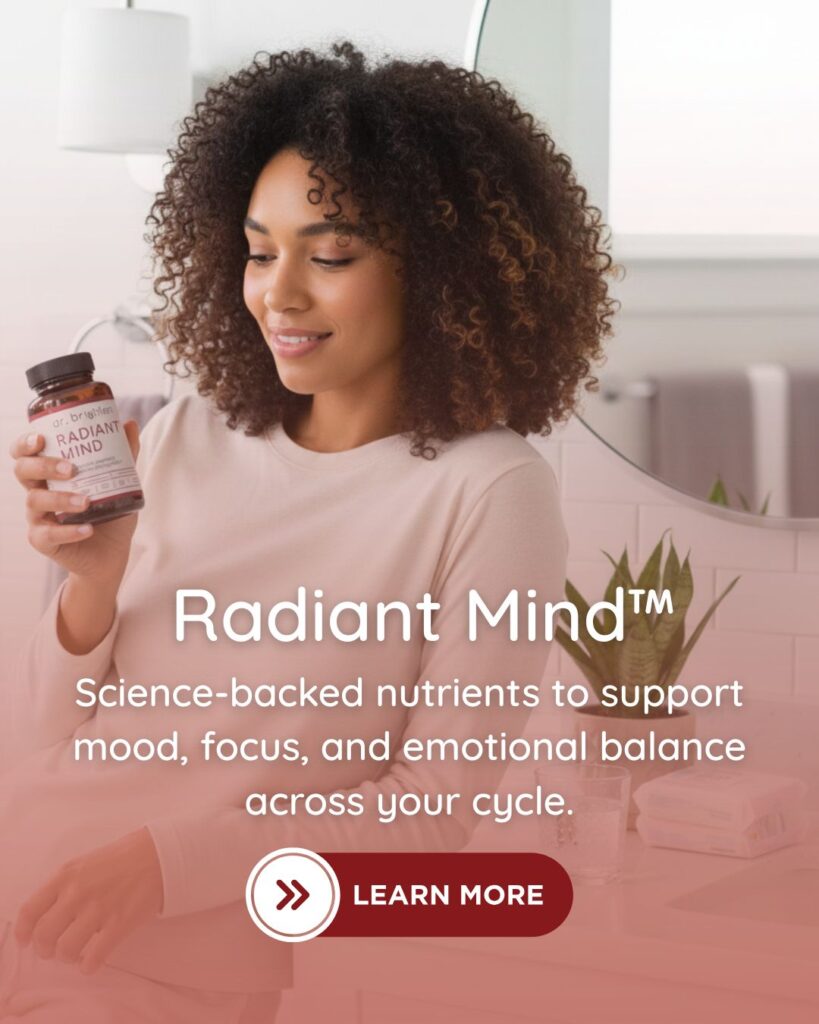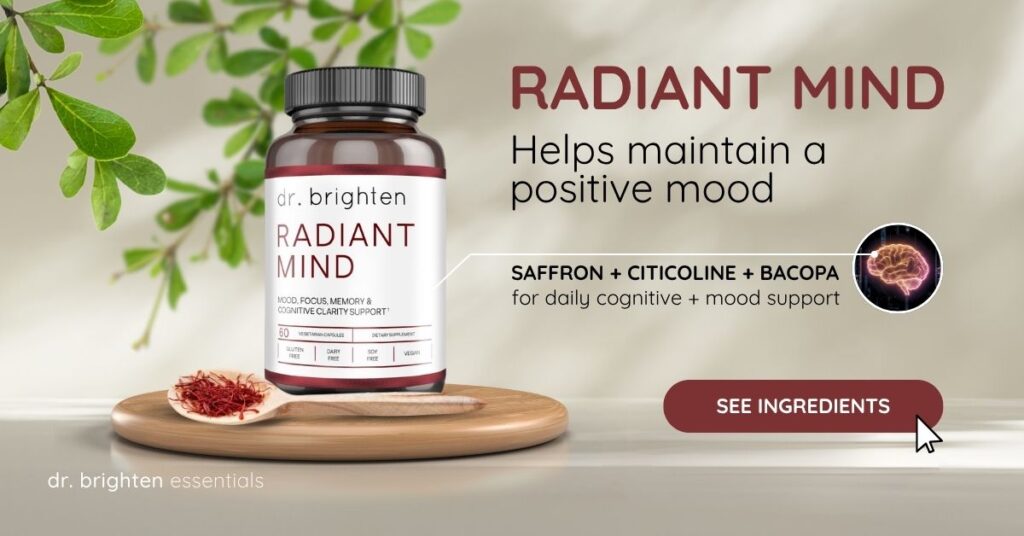Premenstrual Dysphoric Disorder (PMDD) is more than just “bad PMS.” It’s a severe and even debilitating condition that affects women's moods, energy, and mental clarity in the two weeks leading up to their period.
While antidepressants are often prescribed, more women are exploring natural PMDD solutions that support both mood and hormone balance—without harsh side effects. One of the most promising? Saffron.
Clinical research shows saffron may ease irritability, anxiety, and mood swings1 associated with PMDD. And when paired with other key nutrients like citicoline, bacopa, and zinc—as found in Radiant Mind—it offers a comprehensive way to support PMDD naturally through science-backed brain and hormone support.
Let’s take a closer look at saffron and PMDD, including how it works, what symptoms it actually helps, and how to use it.
In this article:
- TL;DR: Saffron and PMDD — What You Need to Know
- What Is Saffron and How It Helps PMDD Naturally
- The Science Behind Saffron and PMDD Relief
- Clinical Studies: Saffron and PMDD Symptom Relief
- Saffron and PMS: Broader Benefits for Hormonal Health
- How to Use Saffron for PMDD: Dosage, Safety & Best Results
- How to Help PMDD Naturally and Why Saffron Stands Out
- Frequently Asked Questions About Saffron and PMDD
TL;DR: Saffron and PMDD — What You Need to Know
- Saffron is one of the most studied natural PMDD solutions.
Clinical research shows saffron extract may help ease irritability, anxiety, mood swings, and low motivation in women with PMDD by supporting serotonin and GABA balance.
- It works through multiple mechanisms.
Saffron’s active compounds (crocin, crocetin, and safranal) help lower cortisol, reduce inflammation, and enhance BDNF, supporting emotional stability, focus, and resilience during the luteal phase.
- Research shows saffron may work as effectively as certain SSRIs, but with fewer reported side effects—making it a safe, gentle option for those seeking to treat PMDD naturally or explore holistic PMDD treatment options.
- Optimal dosage: 30–60 mg of standardized saffron extract daily (such as Affron®), taken with food for best absorption. Consistency matters—most benefits appear after two menstrual cycles.
- Combine saffron with other supportive nutrients.
Magnesium, vitamin B6, omega-3s, and adaptogens can enhance saffron’s mood and hormone-balancing effects for comprehensive PMDD natural help.
- Try Radiant Mind for complete support.
Radiant Mind combines saffron (Affron®) with citicoline (Cognizin®), bacopa, and zinc to support mood, focus, and emotional balance—ideal for women navigating PMDD, perimenopause, or ADHD-related hormonal shifts.
→ Learn more about Radiant Mind
- Saffron is generally safe and well-tolerated.
Mild digestive upset is rare; avoid during pregnancy or while breastfeeding unless advised by your healthcare provider.
- Bottom line: Saffron offers evidence-backed, natural support for mood and hormone balance. When taken consistently and paired with healthy lifestyle habits, it’s one of the most promising natural ways to help PMDD and enhance emotional well-being.
What Is Saffron and How It Helps PMDD Naturally
Saffron is a bright red spice derived from the flower Crocus sativus. It's used for culinary purposes, but it also has a long history of use in traditional Persian, Indian, and Chinese medicine, mostly for its mood-enhancing and anti-inflammatory effects.
In recent years, saffron has become known as a natural mood lifter, based on scientific findings about its benefits for mental health2.
These include saffron's ability to help:
- Reduce symptoms of depression and anxiety3
- Improve mood and emotional resilience
- Help with relaxation and sleep
- Support focus and cognitive performance, including under stress
- Support hormone-related mood disorders like PMS and PMDD
Related:
Best Saffron Supplement for Mood, Anxiety, ADHD & PMS
How Hormones Affect Mood Throughout Your Menstrual Cycle
How Saffron Supports Serotonin and Mood in PMDD
While it’s not officially classified as one, studies suggest that saffron works similarly (and just as well) to some medications4 taken for depression and anxiety called SSRIs (selective serotonin reuptake inhibitors). However, it usually does this without causing many of the side effects associated with SSRIs.
Saffron is an herb and a natural compound, and therefore not a prescription drug. But because of its mechanisms—including how it supports the balance of certain “feel good” neurochemicals—saffron therapy for PMDD and depression is becoming a hot area of research.
Quick Facts: Saffron and PMDD
- Studied dose: 30–60 mg/day standardized saffron extract (Affron® or Satiereal®)
- Benefits: Improved mood, reduced anxiety and irritability
- Works via: Serotonin, GABA, cortisol, and inflammation modulation
- Onset: Within 1–2 menstrual cycles
Why Holistic Support Matters for PMDD
PMDD isn’t just a serotonin issue—it’s an interplay between hormones, brain chemistry, and inflammation.
That’s why saffron fits perfectly within a PMDD holistic treatment approach, addressing multiple biological pathways: serotonin regulation, cortisol reduction, and antioxidant protection.

The Science Behind Saffron and PMDD Relief
Saffron contains several active compounds, most notably crocin, crocetin, and safranal5, which are believed to be responsible for its beneficial neurological effects.
Here's how the compounds found within saffron can help improve mood and potentially manage PMDD and PMS:
- Can help boost serotonin: Saffron appears to inhibit serotonin reuptake, which can help balance neurotransmitters associated with mood regulation, giving it the ability to reduce PMDD symptoms like anxiety, irritability, mood swings, and depression. For example, one study6 found that safranal can mitigate depressive symptoms through neurotransmitter regulation, as well as anti-inflammatory effects, and neuroprotection.
- Can reduce inflammation: Chronic inflammation is linked to PMDD and mood disorders; saffron acts as a natural anti-inflammatory, which can support overall brain function, mental well-being, and hormonal balance.
- Act as antioxidants to support cognitive function: Saffron's compounds can help protect the brain from oxidative stress, supporting long-term cognitive health and performance. Studies suggest that saffron has the potential to improve focus and even manage ADHD symptoms7 (with very little risk for side effects). It's even being researched as a protective agent against neurological diseases8, such as Alzheimer's disease, for example.
- Can increase BDNF (Brain-Derived Neurotrophic Factor): Saffron may increase BDNF, which supports neuroplasticity and resilience to stress.
- Help to modulate cortisol: Saffron helps lower cortisol, easing hormonal stress responses.
Quick Summary: How Saffron May Help PMDD
- Balances serotonin and GABA for mood regulation
- Lowers cortisol to reduce stress reactivity
- Acts as a natural anti-inflammatory
- May increase BDNF to support emotional resilience
These combined actions make saffron one of the best-studied PMDD supplements for supporting mood and hormone balance.
How Saffron Supports Mood in PMDD
| Saffron Supports | Mechanism | Results |
| Balances neurotransmitters | Serotonin & GABA Support | Helps ease irritability, anxiety, and mood swings |
| Reduces neuroinflammation | Anti-Inflammatory Action | Linked to improved emotional stability |
| Enhances brain resilience | BDNF & Neuroplasticity | Supports adaptation to hormonal stress |
| Lowers stress hormones | Cortisol Regulation | Eases tension, sleep issues, and fatigue |
| Protects brain from oxidative stress | Antioxidant Protection | Supports focus and calm during luteal phase |
Related:
ADHD and PMDD Hormone Connection
Histamine and PMDD: The Hidden Link Worsening Your Symptoms

Clinical Studies: Saffron and PMDD Symptom Relief
Clinical studies exploring saffron and PMDD show promising results. While saffron isn’t a prescription drug, research suggests it may help reduce mood swings, anxiety, and irritability in the luteal phase—helping women manage symptoms through a more holistic treatment approach.
PMDD symptoms typically include irritability, mood swings, anxiety, crying spells, anger, fatigue, and even suicidal ideation. These symptoms usually occur during the luteal phase (the second half) of the menstrual cycle, prior to someone's period starting.
So, how does saffron for PMDD help?
As mentioned above, saffron targets many of the underlying causes of PMDD, including low serotonin levels, hormone-related mood changes, and heightened inflammation and oxidative stress. Its active compounds (like crocin and safranal) have antidepressant, anti-anxiety, and anti-inflammatory effects, helping to improve mood, reduce irritability, and support emotional balance throughout the menstrual cycle.
Here's what studies show about how well it works among those with PMDD:
In one randomized controlled trial9 of 120 women diagnosed with PMDD, participants were assigned to take either saffron (15 mg twice daily), fluoxetine (an SSRI that has brand names including Prozac), or a placebo during the luteal phase for two menstrual cycles.
Results showed that both saffron and fluoxetine significantly reduced PMDD symptoms, including mood swings, irritability, and anxiety. However, saffron demonstrated greater improvements than placebo and caused fewer side effects than fluoxetine.
Researchers concluded that saffron is an effective and well-tolerated herbal therapy for PMDD, offering antidepressant and mood-stabilizing benefits comparable to SSRIs, but with a lower risk of adverse effects.
Other studies support saffron’s ability to regulate cortisol, reduce inflammatory cytokines, and increase GABA and serotonin activity, which are all key issues involved in PMDD.
In short, saffron is a mood enhancer that has the potential to help with:
- Emotional sensitivity and outbursts
- Crying spells and anger
- Lethargy and low motivation
- Anxiety and tension
- Sleep disturbances
- Possibly pain, since pain usually gets worse with stress, depression, and lack of sleep.
Real-World Application:
Many women use saffron as part of a PMDD holistic treatment plan that includes lifestyle strategies and targeted nutrients. Formulas like Radiant Mind combine saffron (Affron®) with citicoline (Cognizin®), bacopa, and zinc—offering comprehensive support for emotional stability and focus during the luteal phase.
→ Learn more about Radiant Mind here
Related:
Guide to Treating PMDD (Premenstrual Dysphoric Disorder)
Unlocking the Power of the Menstrual Cycle: Hormone Health, PMDD & Period Care with Ashley Greene

Saffron and PMS: Broader Benefits for Hormonal Health
Even for women who don’t meet the criteria for PMDD, saffron can still help with PMS (premenstrual syndrome), as well as many other aspects of health. So let’s talk saffron and PMS, considering it's very common (more so than PMDD).
Several studies have shown that saffron can help reduce PMS symptoms, such as:
- Breast tenderness
- Bloating and menstrual cramps
- Fatigue
- Mood changes
- Irritability
- Food cravings
- Trouble sleeping
For example, a 2024 review10 showed that saffron has uses in managing reproductive, hormonal, and mental health issues, including PMS and sleep-related troubles. Researchers found that saffron and its active carotenoids—crocin and crocetin—exert anti-inflammatory, antioxidant, and hormone-regulating effects that can benefit both men and women. For women, saffron showed promise in reducing menstrual pain (dysmenorrhea), easing hormonal fluctuations, and improving menstrual regularity.
Another randomized triple‑blind clinical trial11 found that saffron significantly reduced the severity of PMS symptoms among young women (who were under 35) who took either 30 mg of dried saffron extract daily or a placebo for two menstrual cycles. By the end of the study, those taking saffron showed a marked reduction in overall PMS severity compared to the placebo group, including reduced emotional and physical symptoms such as irritability, fatigue, and mood swings.
The authors concluded, “saffron could be an effective and well‑tolerated natural therapy for PMS relief.” Yet another review from 202212 found the same results.
Studies confirm that saffron is safe within therapeutic dosages, with few to no serious side effects, making it a well-tolerated natural option for hormonal and emotional balance. And it’s particularly helpful for women with co-occurring conditions like anxiety or depression, which often flare during the luteal phase.
Other Health Benefits of Saffron:
According to the review13 mentioned above, saffron has “diverse clinical applications” beyond PMS and PMDD, extending to cardiovascular health, diabetes management, sleep quality, psychiatric illnesses, and rheumatoid arthritis.
For example, saffron has been shown to have positive effects on blood pressure, blood sugar (glucose) levels, cognitive function (including among those with trouble focusing or remembering information), and inflammatory markers.

How to Use Saffron for PMDD: Dosage, Safety & Best Results
When it comes to dosage, the sweet spot for saffron seems to be 30 to 60 milligrams per day, divided into two doses. This amount is:
- Effective for mood support, PMS, and PMDD
- Well-tolerated with few reported side effects
- Safe for use over several weeks or months
Here's how to take it:
- Look for capsules or softgels standardized to at least 2% safranal or 3% crocin
- Patented extracts like Affron® or Satiereal® are reliable, since these have been used in clinical studies
- Take saffron with food for the best absorption
- Take it in the evening if it makes you sleepy
- Be consistent—since saffron works best over 2+ cycles
- Track your symptoms in a journal or app to notice changes or patterns
Can I Combine Saffron with Other Supplements?
Yes, but it’s best to consult your healthcare provider, especially if you take SSRIs or hormone therapy. But in most cases, saffron stacks well with magnesium, B6, omega-3s, L-theanine, bacopa, and adaptogens like ashwagandha or rhodiola (depending on your symptoms and needs).
For an all-in-one formula that combines multiple mood-supporting supplements, consider trying Radiant Mind—which combines clinically studied ingredients like saffron (affron®), citicoline (Cognizin®), bacopa, and zinc.
These ingredients all work together to support mood, focus, and emotional balance. Radiant Mind is a convenient, research-backed option for those looking to improve executive function, reduce anxiety, and enhance resilience, including during hormonal shifts like PMDD or perimenopause.
Who Should Use Caution?
Avoid saffron supplements during pregnancy or while breastfeeding. And check with your doctor if you’re on antidepressants, blood thinners, or hormone therapy.

How to Help PMDD Naturally and Why Saffron Stands Out
Yes, saffron helps regulate mood by targeting several neurotransmitters and pathways involved in emotional balance. It’s especially promising for women struggling with mood swings, anxiety, and mental fatigue related to hormone fluctuations.
If you’ve been battling PMDD or PMS and want a natural solution with real science behind it, saffron might be worth exploring. It’s one of the few botanical options with multiple clinical trials supporting its benefits for emotional well-being, hormone-related mood issues, and even general anxiety and depression.
Key takeaways about Saffron for PMDD & PMS:
- Saffron has been shown in studies to reduce irritability, mood swings, and anxiety.
- Works similarly to SSRIs, but with fewer side effects.
- It works via serotonin, GABA, and anti-inflammatory and antioxidant pathways.
- Improves PMDD and PMS symptoms like fatigue, cravings, and sleep disturbances.
- Ideal dose: 30–60 mg daily with food (look for Affron®, the type found in Radiant Mind).
- Safe and effective for long-term use in most women.
- It's most effective when used consistently and paired with lifestyle practices like sleep, exercise, and stress management.
Looking for a Hormone-Friendly ADHD + Mood Stack?
If you’re navigating ADHD, PMDD, or mood swings around your cycle, don’t miss my free 5-day mini course: The ADHD Women's Hormone & Brain Sync Mini Course. Learn how to align your brain with your cycle for better focus, energy, and emotional stability. Sign up here.
Frequently Asked Questions About Saffron and PMDD
Clinical research suggests saffron extract may help ease symptoms associated with PMDD—such as mood swings, anxiety, irritability, and low energy—by supporting serotonin balance and lowering inflammation.
While saffron isn’t a prescription treatment, it has been shown in multiple studies to promote emotional well-being and resilience, making it a promising part of a PMDD holistic treatment plan.
Saffron’s active compounds—crocin, crocetin, and safranal—support neurotransmitters like serotonin and GABA, calm stress hormones such as cortisol, and reduce oxidative stress in the brain.
These combined effects may help regulate emotional stability, sleep, and cognitive function throughout the luteal phase of the menstrual cycle.
Most clinical trials on saffron and PMDD used 30–60 mg of standardized saffron extract daily, divided into two doses and taken with food.
Look for supplements that use clinically studied extracts like Affron® or Satiereal®, which are consistent in potency.
Saffron works best when taken consistently for at least two menstrual cycles.
Saffron can play a key role in treating PMDD naturally, but it’s most effective when part of a PMDD holistic treatment plan that includes sleep, stress management, and nutrition support. Combining saffron with nutrients like magnesium, vitamin B6, omega-3s, and adaptogens can provide additional PMDD natural help and improve overall hormone balance.
Evidence-informed supplements for PMDD include saffron, magnesium, vitamin B6, omega-3s, and chaste tree berry (Vitex).
For a comprehensive approach, Radiant Mind combines clinically studied saffron (Affron®) with citicoline (Cognizin®), bacopa, and zinc to support neurotransmitter balance, focus, and emotional resilience throughout your cycle.
Saffron is generally considered safe when taken in standard supplement doses (30–60 mg daily).
Clinical trials report few side effects, most commonly mild digestive upset if taken on an empty stomach.
Avoid using saffron during pregnancy or while breastfeeding unless directed by your healthcare provider.
Most women notice improvements within one to two menstrual cycles of consistent use.
Because saffron works by supporting neurotransmitter balance and neuroplasticity, its benefits build gradually over time rather than offering instant relief.
Saffron may have overlapping effects with SSRIs and hormone therapy, so it’s best to consult your healthcare provider before combining them.
Research suggests saffron can complement other therapies by supporting mood naturally, but dosage and timing should be personalized.
In clinical trials, saffron performed similarly to fluoxetine (Prozac) in reducing PMDD and depression symptoms, with significantly fewer reported side effects.
Saffron offers a gentler, botanical option for those seeking natural PMDD solutions—though it’s not intended to replace medical treatment when prescribed.
Yes. Saffron has been studied for mood regulation, attention, and stress support, and may help ease symptoms that overlap between PMDD, anxiety, ADHD, and perimenopause.
That’s why saffron is featured in Radiant Mind, formulated to support women navigating hormonal shifts and cognitive changes.
Radiant Mind is a research-backed supplement combining saffron extract (Affron®) with Cognizin® citicoline, bacopa, and zinc—nutrients shown to support dopamine and acetylcholine activity for focus and mood.
Together, these ingredients provide PMDD natural help by supporting brain chemistry, reducing stress, and improving emotional balance throughout your cycle.
PMDD is a more severe form of PMS with pronounced emotional and cognitive symptoms.
Studies show saffron can benefit both PMS and PMDD by improving mood, reducing irritability, and supporting overall hormonal balance.
For best results, pair saffron supplementation with lifestyle strategies such as:
– Balanced, anti-inflammatory nutrition
– Consistent sleep and circadian rhythm support
– Regular physical activity
– Mind-body practices like yoga or breathwork
These habits amplify saffron’s effects and help you treat PMDD naturally from a whole-body perspective.
You can learn more about saffron and women’s hormone health throughout this site, or explore Radiant Mind, which contains clinical-grade saffron (Affron®) along with synergistic nutrients for brain and hormone support.
→ Learn more about Radiant Mind here.
No herbal or dietary supplement is FDA-approved to diagnose, treat, cure, or prevent PMDD. However, saffron has been evaluated in peer-reviewed research for its potential to support mood and hormone-related symptoms safely and effectively.
What’s the takeaway on saffron for PMDD?
Saffron offers an evidence-backed, natural way to support emotional balance, focus, and resilience during the luteal phase.
When used consistently—and ideally combined with holistic strategies or formulas like Radiant Mind—saffron can be a powerful part of your PMDD natural solution toolkit.
PMDD can feel isolating, but support exists—and saffron offers one of the most promising natural ways to feel more balanced, calm, and in control each month. When combined with the brain-nourishing nutrients in Radiant Mind, you have a daily formula designed to help your hormones and mood work with you, not against you.
References reviewed and verified by Dr. Jolene Brighten, board certified naturopathic endocrinologist, certified menopause practitioner, certified sex counselor, nutrition scientist for accuracy and compliance. Last medically reviewed October 2025.
References
- https://pmc.ncbi.nlm.nih.gov/articles/PMC4643654/ ↩︎
- https://pmc.ncbi.nlm.nih.gov/articles/PMC9464341/ ↩︎
- https://pubmed.ncbi.nlm.nih.gov/31135916/ ↩︎
- https://pubmed.ncbi.nlm.nih.gov/32221179/ ↩︎
- https://pmc.ncbi.nlm.nih.gov/articles/PMC9464341/ ↩︎
- https://pubmed.ncbi.nlm.nih.gov/39351321/ ↩︎
- https://pubmed.ncbi.nlm.nih.gov/37864351/ ↩︎
- https://pmc.ncbi.nlm.nih.gov/articles/PMC9781906/ ↩︎
- https://pubmed.ncbi.nlm.nih.gov/33457343/ ↩︎
- https://pubmed.ncbi.nlm.nih.gov/38694315/ ↩︎
- https://www.sciencedirect.com/science/article/abs/pii/S187638201530010X ↩︎
- https://pmc.ncbi.nlm.nih.gov/articles/PMC9790166/ ↩︎
- https://pubmed.ncbi.nlm.nih.gov/38694315/ ↩︎

